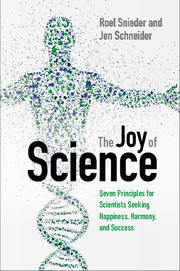2 - Courage
Published online by Cambridge University Press: 05 June 2016
Summary
“You cannot do to the external world what you cannot do to the world within yourself.” Modified from an interview by Sandra Herrington with Laurens van der Post (1992)
We argue that doing science is, in some ways, inherently courageous. Finishing a college degree in science, then going to graduate school, on to a postdoc, and then on the job market may all take great courage, depending on your origins and circumstances. Furthermore, scientists usually are inquisitive people whose job it is to carry out innovation and discovery. For this reason, we think of the scientific community as being, in some ways, very open-minded to change and inquiry. Our personal experience also tells us that many scientists are comfortable challenging the status quo and authority – whether academically or politically – and many speak their minds freely.
This spirit of inquiry is often essential to doing the work of science. To move our work forward, we may have to let go of things we have learned or suspend our tendency toward disbelief and cynicism. A case in point is the development of the theory of special relativity by Einstein. A cornerstone in this theory is the assumption that the speed of light is always the same. At first sight this seems preposterous: How can two observers that move with respect to each other see the same photon move at the same speed? Yet by simply assuming the constancy of the speed of light and logically deriving its consequences, Einstein changed our worldview with the theory of special relativity. He admittedly did not make his assumption out off the blue – there were experimental indications – but it still took great courage to build a new theory on a foundation that seemed to fly in the face of common “knowledge.”
On the other hand, we also believe that the scientific community is somewhat conservative, meaning it resists change, especially when the concepts and ideas underlying the change are unfamiliar. Scientists often approach change with skepticism because skepticism allows them to critically evaluate new information. Such resistance is described in great detail in the book The Structure of Scientific Revolutions by Thomas Kuhn (1962).
Information
- Type
- Chapter
- Information
- The Joy of ScienceSeven Principles for Scientists Seeking Happiness, Harmony, and Success, pp. 35 - 53Publisher: Cambridge University PressPrint publication year: 2016
